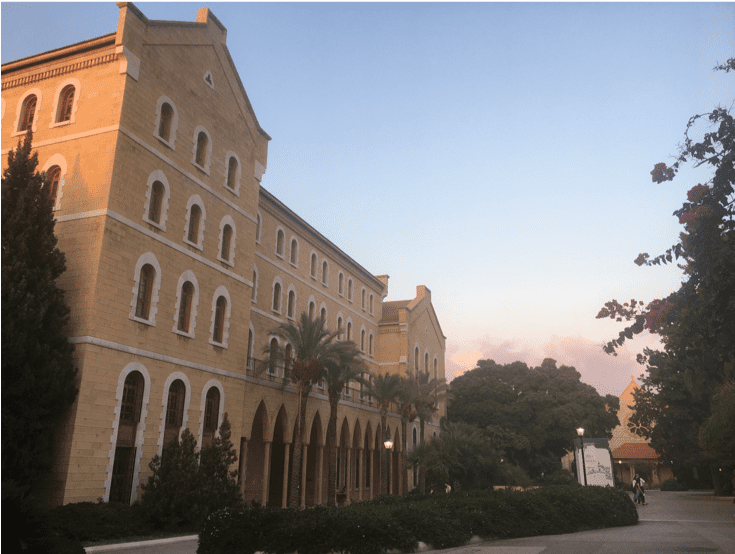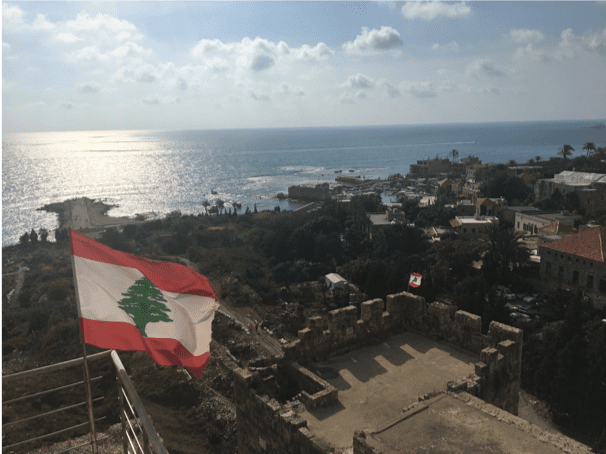I was fortunate to spend Summer 2018 in Beirut, Lebanon, first as a Visiting Fellow at the National Democratic Institute (NDI) and then as a participant studying Elementary Arabic and Culture at the American University of Beirut’s (AUB) Center for Arab and Middle Eastern Studies. I was incredibly fortunate to have these opportunities as a Carlucci Fellow at Sanford.
Anyone familiar with Lebanese history knows that the more than seven decades since the end of French mandatory rule here have seen every conceivable form of tumult imaginable. The country’s unusual religious (confessional) and, in turn, political pluralism has created a tenuous balance among some eighteen different religions and sects, who share power at the highest levels (President, Prime Minster, and Speaker of Parliament) and interact in the course of daily Lebanese life among neighbors, business partners, friends, and strangers. The relative calm since the Taif Agreement at the end of the country’s civil war (1975-1990) has waxed and waned at various times, usually a function of external developments and regional geopolitical events (e.g. Israel, the Syrian conflict and resulting refugee crisis, intervention by Saudi Arabia in Lebanese domestic affairs) and the emergence and evolution of Hezbollah as both a political and militant organization, to name a few.
I arrived in Beirut at a critical juncture, just one week after the country’s latest parliamentary elections and at the beginning of Ramadan. The country last held parliamentary elections in 2009; subsequent rounds were postponed and the mandate of the 2009 parliament extended repeatedly on the basis of instability in neighboring Syria and its direct impact on Lebanon. The full story – as always – is a bit more complicated, but outside observers were cautiously optimistic that agreement two years prior over the status of Christian (Maronite) President Michel Aoun, the decline of ISIS, and “light at the end of the tunnel” for the millions of Syrian refugees in Lebanon might herald a new chapter in Lebanese politics. The reality, unfortunately, was less assured. Turnout was lower than had been hoped, and there was widespread confusion surrounding a new election law that was enacted the preceding year. As a result, Lebanon has yet to form its next government; talks over cabinet/ministerial division among competing blocs, for example, are ongoing. (This is not unusual in Lebanon, as post-election planning and bargaining typically takes weeks or months before consensus is reached.) Observers are hopeful that necessary agreements can be reached before the new parliament is due to convene next month.
At NDI, I was invited to observe* the ongoing post-election debrief within the organization (NDI is an American NGO that supports governance and elections initiatives in numerous countries but does not take a position on specific candidates or advocate for a particular outcome) as a Visiting Fellow. In this role, I accompanied NDI staff in several meetings with an array of stakeholders and learned about the Lebanese political climate before, during, and after the election. As a former (U.S.) Congressional staffer with experience in the foreign assistance appropriations process, I was particularly interested to view the effects that outside support for democratic governance in Lebanon has had over the years. It remains anyone’s guess how the process will play out at this point, but I was grateful to have the opportunity to witness the process firsthand and am optimistic that an agreement will be reached in the coming weeks.
I spent the second half of my summer enrolled at AUB’s Center for Arab and Middle Eastern Studies, learning Arabic in an intensive program designed to teach both formal (Modern Standard) and colloquial (Lebanese/Levantine) Arabic, as well as provide an in-depth experiential immersion in Lebanese history and culture. The program was designed around 4-5 hours of daily classroom instruction in small groups, followed by 4-5 hours of personal work at home. This routine was complemented with films and outings, both in Beirut and (on the weekend) to sites around the country. It was very intensive, but the language is challenging (who knew?), but I am grateful to have had this opportunity as well.
I could not have asked for a more interesting, enlightening, and beneficial summer experience over the past three months, and I am indebted to the Carlucci family for making it possible.
* I was a guest of NDI, not a paid employee, and the views expressed in this blog are my own and do not necessarily reflect those of the National Democratic Institute. I did not, and do not, in any way speak for NDI.

For one such outing, we traveled to the Beqaa Valley to meet and play with Syrian refugee children in a camp near the Syrian border, in the hills beyond the ridge in the above picture.

The American University of Beirut
The Lebanese Parliament





Comments are closed, but trackbacks and pingbacks are open.